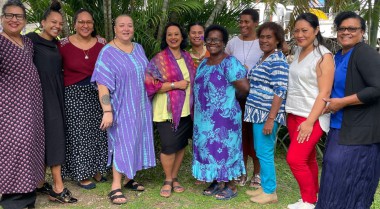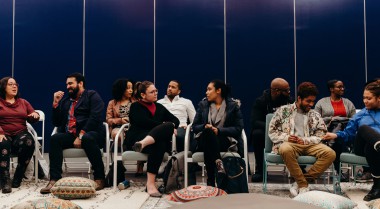
Integrating the WPS agenda across the Humanitarian-Development-Peace nexus: Learnings from the Pacific
The Pacific Island region is often seen through a picture-perfect, postcard romantic lens - a dream place to live. However, beyond the picturesque facade lie multifaceted challenges, from the looming threat of the global climate crisis to development challenges to internal conflicts and interstate tensions. Gender stereotypes, poverty, displacement, loss of livelihoods, lack of representation, and growing securitisation disproportionately affect women in communities, making them more susceptible to violence.
In the reality of the Pacific and many other contexts, strategic action across humanitarian-development-peace efforts (the Triple Nexus approach) with a gender lens is imperative. Women peacebuilders in the Pacific - organising through regional and global networks and coalitions - were among the first to conceptualise the Triple Nexus and, despite the obstacles they face, have taken concrete action to advance the principles of the Women, Peace and Security (WPS) Agenda across the Triple Nexus.
What does it mean to integrate the WPS Agenda across the Triple Nexus?
Traditionally, and very broadly speaking, the WPS agenda focuses on promoting women's rights and advancing a gender-transformative approach across the conflict cycle. This entails challenging gender inequality by transforming harmful gender norms, roles, and relations. This also requires meaningful and intentional women's participation in decision-making, with feedback. Finally, it involves working towards redistributing power, resources, and services more equitably in humanitarian, development and peace activities.
How do Pacific women lead the gender-sensitive climate agenda with concrete impact?
Climate change is one of the challenges that requires response across the Triple Nexus. Pacific women have successfully brought the Women, Peace, and Security (WPS) agenda into climate work.
First and foremost, climate change leads to disasters and risks that require gender-sensitivity e responses. In a programmatic sense, since the 2015 inclusion of "climate change" in UNSCR2242, the Pacific Island region has faced seven category-five cyclones. Each time, women peacebuilders have helped unpack the link between economic insecurity and domestic and community violence due to the loss of livelihoods. Working with LGBTQIA+ and disability rights activists, as well as faith-based and traditional leaders, they have advocated for livelihood support in relevant communities, demonstrating how peacebuilding and conflict prevention must not be an afterthought in disaster management and humanitarian action. In the policy spaces, such as the upcoming 68th Session of the Commission on the Status of Women, we will be advocating our recommendations of how the Sendai Framework for Disaster Risk Reduction Gender Action Plan can demonstrate how this can be done.
As climate change impacts undermine the Pacific countries' ability to achieve sustainable development by threatening food security, water availability and livelihoods, Pacific women addressed the situation of women by delivering financial literacy and small business training. As a result, women have established and maintained micro-enterprises while gaining further control over household spending, increasing the community's resilience to manage potential financial shocks.
Further, the Pacific women have advocated for understanding climate change as a key challenge to international peace and security. Their work led to the development of the Boe Declaration on Regional Security, which suggests that human security implies the analysis of diverse risks, including economic, food, health, environmental, personal, community, and political risks. As a result of the leadership of the Pacific women peacebuilders, the 2015 UNSC Resolution 2242 on Women, Peace and Security also noted 'the changing global context of peace and security, in particular relating to [...] the impacts of climate change' and reiterated 'its intention to increase attention to women, peace and security as a cross-cutting subject in all relevant thematic areas of work on [the UNSC] agenda' (S/RES/2242, PP13).
Connecting the dots between various thematic areas of work not only makes the action more comprehensive and leads to the best impact but also enables local partners to navigate funding challenges better, pulling resources from various streams of available funding towards advancing and sustaining peace globally.
How to integrate the WPS agenda across Triple Nexus action?
The impact of Pacific women's work in integrating WPS principles into climate action showcases the transformative potential of gender analysis and gender-sensitive action. Given the urgency in addressing climate change and its impacts across the Triple Nexus, the Pacific women's approach serves as a model for other women worldwide.
It's a call to action to bring the WPS agenda into diverse policy spaces, forging networks and partnerships that transcend traditional boundaries and create lasting change.
If you're wondering how to get started, here are some points for you to consider:
- Forge collaborations to draw together peacebuilding, community-led activism, locally-driven innovation and expertise, highlighting collective and personal lived experiences. Develop messages to amplify diverse women's recommendations on how our leaders can use a peace-development and humanitarian nexus approach to achieve inclusive localisation, build resilient and peaceful communities and also ensure equitable access to resources to fulfil the needs and priorities of diverse local women.
- Convene learning exchanges with political actors to enhance knowledge, capabilities and understanding from the community to the policy table. Demonstrate how a triple nexus approach provides a practical framework to operationalise WPS and Human Security commitments. Such an approach can contribute to increasing diversity in women's leadership and engagement and the application of inclusive conflict prevention across the development, security and humanitarian sectors.
- Stay informed about the work of donors in your context and explore potential avenues for collaboration.
- Keep track of the most recent policy changes across the Triple Nexus to identify opportunities for advocacy and action.
The upcoming 68th Commission on the Status of Women in New York presents an excellent opportunity to begin planning your next steps. While physical attendance offers valuable networking opportunities, there are also many ways to get involved remotely, as numerous side events are live-streamed. Take advantage of this moment to engage, learn, and collaborate towards advancing the WPS agenda in your own context. Click here for more information on how to participate.


